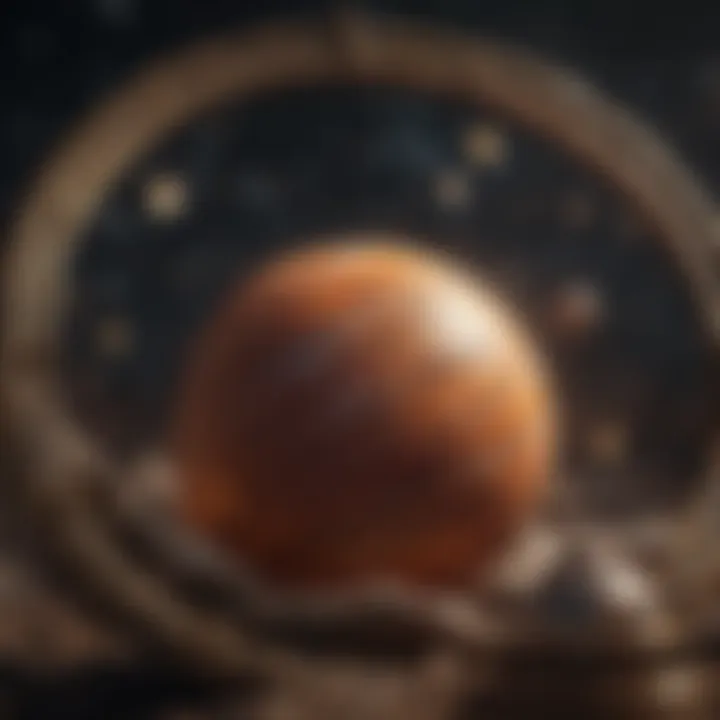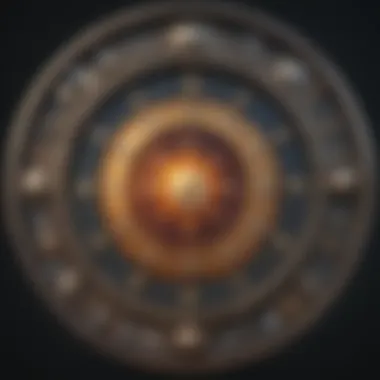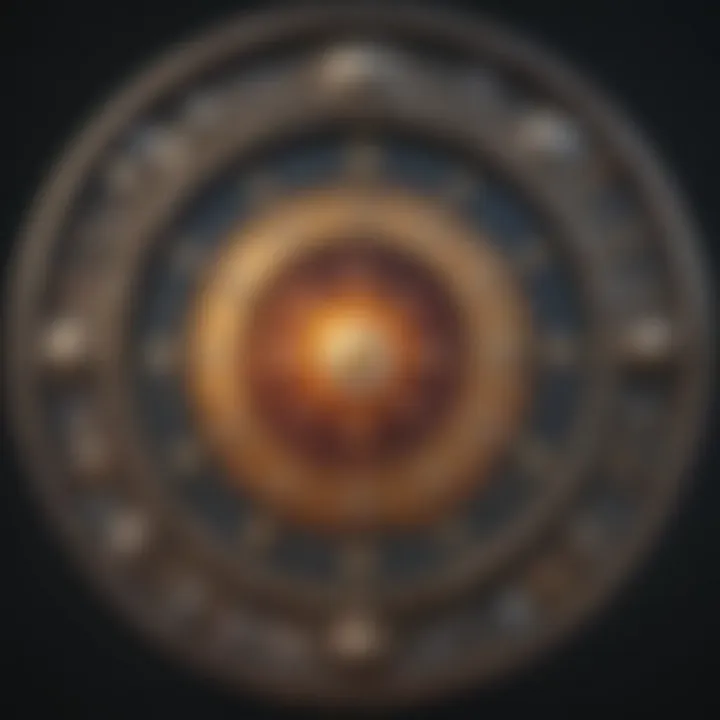Understanding Astro Horoscopes: Insights and Impact


Intro
Astrology, an age-old practice blending art and science, has captured human imagination for centuries. It's not just about predicting the future or deciphering personality traits; it offers a lens through which we can view our lives and choices. In today’s world, the allure of astrological insights remains potent, with many turning to it for guidance in personal and communal matters. This exploration aims to unpack the vast realm of astro horoscopes, showcasing not only the underlying principles but also their relevance in today’s fast-paced society.
With evolving perspectives on astrology as a tool for self-awareness and growth, we will navigate through foundational concepts, the intricacies of zodiac signs, and the cosmic influences that shape our lives. Each section is designed to shed light on how celestial bodies can serve as both guiding stars and reflective mirrors for our personal journeys.
Astrological Concepts
Definition of Key Terms
Before diving deeper, it’s essential to clarify some fundamental terms within astrology. Horoscope refers to a chart mapping celestial bodies at a specific time, typically at a person's birth. Zodiac, on the other hand, is a belt of the heavens divided into twelve signs, each associated with distinct personality traits and qualities.
Another essential concept is aspects, describing the angles formed between planets that influence various facets of our lives. It’s the precise relationship of these planets that can offer deeper insight into personal dynamics and events.
Historical Background of Astrology
Astrology's roots stretch back thousands of years. Ancient civilizations, from the Babylonians to the Greeks, utilized celestial observations to understand themselves and their surroundings. The Greeks, notably, played a crucial role in shaping modern astrology, introducing concepts such as the twelve zodiac signs and horoscopes. This practice gradually morphed into an intricate system where astrological insights guided many major life decisions and societal structures.
Overview of Different Astrology Branches
Astrology isn't monolithic; it branches out into various techniques. Natal astrology focuses on individual birth charts, offering personal insights based on the position of celestial bodies at birth. In contrast, mundane astrology explores world events, predicting societal shifts or political changes. Additionally, horary astrology seeks answers to specific questions based on the moment the question is asked, while electional astrology aids in selecting the auspicious times for key life events like weddings or business launches.
These branches reveal the versatility and depth of astrological wisdom, catering to varying needs.
Zodiac Signs Exploration
In-Depth Analysis of Each Sign
The zodiac is a tapestry of twelve signs, each woven with its own set of characteristics and traits. These signs, from Aries to Pisces, influence how individuals perceive the world and interact with it. Understanding the nuances of each sign can illuminate one’s strengths and challenges.
Personality Traits and Characteristics
Every sign comes with its unique personality. For instance, Aries, known for its fiery spirit, embodies enthusiasm and leadership, while Cancer tends to be nurturing and intuitive. Likewise, Libra reflects harmony and balance, often seeking partnerships and social connections. Recognizing these traits not only fosters self-awareness but also enhances interpersonal relationships.
Historical and Mythological Connections
Delving into the mythology behind these zodiac signs enriches their significance. Greek mythology, for example, assigns stories to each sign that reflect its attributes. For Aries, the boldness is often likened to the tale of the golden ram in the legend of the Golden Fleece. Understanding these connections brings a richer context to the austere and glittering walls of zodiac lore.
Celestial Events
Major Cosmic Phenomena
Celestial phenomena like eclipses, retrogrades, and transits have long been observed for their potential impact on human affairs. An eclipse, for instance, can signal a time of change or revelation, while Mercury retrograde is notorious for communication mishaps and reflection.
Impact of Celestial Events on Astrology
These cosmological events often correlate with significant shifts in personal and collective narratives. Each event, when interpreted correctly, can serve as a guide for introspection and divination. For example, understanding the influence of a solar eclipse may prompt an individual to delve into aspects of their life needing transformation.
Rituals and Practices During Celestial Events
Many practitioners engage in specific rituals during celestial events, such as setting intentions during a new moon or conducting cleansing practices during an eclipse. These rituals are not just ceremonial; they offer a way to align personal goals with the energies of the cosmos.
"In astrology, the stars offer guidance, but it’s our choices that carve our paths."
Prolusion to Astro Horoscopes
Astro horoscopes carry profound significance in the world of astrology, acting as a lens through which practitioners can examine the intricate interplay between celestial bodies and human experiences. These insights not only reveal patterns and potentialities in individual lives but also shed light on broader societal trends. A firm grasp on the concept of astro horoscopes enriches one's understanding of astrology, reinforcing its relevance in today's fast-paced world where many seek clarity amidst chaos.
The Historical Context of Astrology
The roots of astrology stretch back thousands of years, weaving through the fabric of ancient civilizations. From the Babylonians, who meticulously charted celestial movements, to the Greeks who extensively philosophized about the nature of stars and their influence on earthly matters, astrology has evolved significantly. The alignment of planets and stars was seen not just as astronomical events but as a divine language. This historical insight provides a robust backdrop for understanding how astro horoscopes have emerged as essential tools for personal exploration.
"Astrology is just a therapy for those who want it to be, a guide for those who seek stability in uncertainty.”
Astrology has evolved from an ancient predictive system to a modern tool for self-discovery and personal growth. Important figures like Ptolemy during antiquity laid the groundwork for later astrologers, influencing interpretations that linger to this day. The Renaissance witnessed a resurgence of astrological interest, merging it with burgeoning scientific inquiry. Meanwhile, the digital age has led astrology to adapt, attracting an audience eager to decode life's mysteries through modern horoscopes.
Defining Astro Horoscopes
At its core, an astro horoscope is a visual representation of the position of celestial bodies at the time of one's birth. These representations offer a narrative of potential emotional paths, personality traits, and life challenges an individual may encounter. Each sign and planet carries distinct meanings that provide insights into areas such as relationships, career choices, and life decisions.
Astro horoscopes incorporate a variety of elements, including:


- Zodiac Signs: The twelve astrological signs represent different aspects of human nature. Each sign corresponds to specific personality traits and behaviors.
- Planets: The planets influence emotional states and perspectives. For instance, Venus is linked to love and beauty, while Mars is associated with action and aggression.
- Houses: The chart is divided into twelve houses, each representing different life areas – from personal identity to partnerships and beyond.
Understanding these components allows individuals to gain a holistic view of their lives, helping them navigate decisions with deeper awareness. Through astro horoscopes, many find not just answers, but also a map of potential growth and exploration.
The Foundations of Astrology
Astrology, often dismissed by some as mere superstition, is deeply rooted in a structured framework that has implications far beyond its surface allure. The foundations of astrology serve as a critical bedrock for understanding astro horoscopes. By observing the cosmos, practitioners have developed a system that dives into how celestial movements impact human experiences and qualities. Whether one is new to the subject or an experienced astrologer, grasping these fundamentals lays the groundwork for meaningful interpretations of horoscopes.
Celestial Bodies and Their Influences
The universe is a vast tapestry, where celestial bodies serve as the threads that weave our destinies. Each planet, star, and moon has its own characteristics and energies that influence the human experience. For instance, consider the role of Jupiter, known as the planet of expansion. Those born under its influence may exhibit traits linked to growth and optimism, likened to a balloon soaring to the sky. Conversely, Saturn often symbolizes restriction and discipline, shaping individuals into focused and resilient beings.
Astrologers analyze the positions of these planets in relation to one another, and to Earth, during significant events like birth. This alignment creates a type of cosmic map that impacts personality traits, life challenges, and paths.
Additionally, the Moon's phases possess a fascinating pull on human emotions and behaviors, as many can attest to feeling a bit more restless during a full moon. These influences are more than just rhetoric; they are observable patterns in both personal narratives and large-scale human events. By understanding the intricate dance of celestial bodies, individuals can discern how these cosmic forces shape their lives.
"Astrology is a language. If you understand this language, the sky speaks to you." - Dane Rudhyar
The Zodiac Signs and Their Characteristics
The Zodiac signs, twelve in total, serve as signposts in the astrological journey. Each sign embodies unique traits and tendencies, providing a framework through which individuals can gain insight into their own identity and relationships.
- Aries: Courageous and full of life, often leading the charge.
- Taurus: Steadfast and dependable, valuing comfort and stability.
- Gemini: Curious and communicative, ever-seeking knowledge and engagement.
- Cancer: Nurturing and intuitive, guided strongly by emotions.
- Leo: Charismatic and creative, a natural performer.
- Virgo: Analytical and detail-oriented, observing the world with a discerning eye.
- Libra: Harmony-seeking, often acting as a mediator among differing viewpoints.
- Scorpio: Intense and passionate, unafraid to delve into complexities.
- Sagittarius: Adventurous and philosophical, in pursuit of freedom and truth.
- Capricorn: Ambitious and disciplined, focused on long-term goals.
- Aquarius: Innovative and unconventional, often ahead of their time.
- Pisces: Empathetic and imaginative, flowing with emotional currents.
Each sign also aligns with one of the four elements: fire, earth, air, and water. This elemental linking further amplifies their inherent characteristics. For instance, fire signs are often seen as energetic and passionate, while earth signs tend to be more grounded and practical.
Understanding these zodiac signs equips individuals not only with self-awareness but also with social insight—how they interact with others and navigate personal relationships. With the foundational knowledge of celestial bodies and the zodiac clearly illuminated, practitioners can begin to interpret astrological data in transformative ways.
Crafting a Personal Horoscope
Creating a personal horoscope is akin to developing a map that guides individuals through the perplexing journey of life. By comprehending the celestial influences at play, one can gain a clearer picture of their strengths, weaknesses, and potential paths to explore. Personal horoscopes encapsulate a vast array of elements, and understanding these can lead to profound personal insights.
Astrology isn't just about predicting the future; it’s primarily about self-exploration. Crafting a personal horoscope allows individuals to discover their inherent qualities and tailor their lives based on cosmic energies. The benefits range from enhancing decision-making skills to nurturing relationships. Personal horoscopes serve as mirrors, reflecting our inner truths and offering advice on how to navigate both smooth sailing and stormy waters.
Essential Components of Horoscope Creation
When one embarks on the journey of creating a personal horoscope, several fundamental components come into play:
- Date and Time of Birth: The precision of a horoscope starts here. The exact moment one takes their first breath marks a unique alignment of celestial bodies that cannot be replicated.
- Birth Location: Geographic coordinates add another layer of depth. The position of celestial bodies varies based on the observer's location, and this greatly influences the chart.
- Zodiac Signs: Each sign brings with it distinct traits and qualities. Understanding one's sun sign, moon sign, and rising sign plays a critical role in interpreting the broader picture of personality and potential.
- Planetary Positions: The positions and aspects of planets at the time of birth craft a deeper narrative that intertwines with the zodiac signs.
- Houses: The twelve astrological houses represent different areas of life, such as career, love, and personal growth. Knowing which sign and planets occupy these houses provides critical insight into an individual's experiences and challenges.
This amalgamation of data creates a unique blueprint for each individual, making every horoscope distinctly personal.
The Role of Birth Charts
In astrology, a birth chart is the foundational document for horoscope crafting. It serves as a cosmic fingerprint, distinctly outlining how the universe was configured at the moment of one's birth. It’s more than just a collection of zodiac signs and planets; it’s a multi-dimensional view of one's potential.
Birth charts allow astrologers to interpret:
- Personal Traits: The dynamics of various planets help in understanding an individual's mannerisms, preferences, and fears.
- Life Challenges: Recognizing challenging aspects between planets can provide clarity on why certain obstacles arise in life.
- Timing of Events: By understanding the progressions and transits of planets, individuals can anticipate favorable and challenging periods in their lives.
- Growth Opportunities: Learning how planetary energies influence actions can lead to personal growth and development.
"Astrology is a language. If you understand this language, the sky speaks to you." - Dane Rudhyar
In sum, crafting a personal horoscope rooted in a detailed birth chart can help individuals navigate the complexities of their lives, strengthening self-awareness and personal growth. By embracing the insights that stem from astrology, people can make informed choices that align their actions with cosmic rhythms.
Interpreting an Astro Horoscope
When diving into the realm of astrology, interpreting an astro horoscope stands as a pivotal aspect. This process not only offers insight into a person's character traits, emotional responses, and life tendencies but also reveals the nuances that guide their interactions with the world. As people look towards horoscopes for guidance, understanding the depths of these interpretations becomes essential. This section sheds light on the key techniques for interpretation and addresses common misconceptions that surround it.
Techniques for Interpretation
Interpreting an astro horoscope isn't merely about spotting the sun sign and calling it a day. It requires careful consideration of various elements and how they influence one another. Here are some techniques that astrologers commonly use:
- Planetary Aspects: Understanding how different celestial bodies interact is crucial. For instance, a square aspect between Mars and Saturn often suggests conflict between aggression and discipline, shaping one's ability to assert without overstepping.
- House Placements: The houses in which planets reside indicate specific areas of life affected by their influence. For example, if Venus is in the 7th house of partnerships, it can signify a strong emphasis on love and relationships.
- Transits and Progressions: Astrologers look at the current positions of planets concerning natal placements to uncover potential life changes or challenges. Transits to a natal Mercury could signal effective communication or misunderstandings, depending on the nature of the transit.
- Synthesis of Information: It's not just about individual components but how they come together to form a coherent picture. Recognizing patterns, such as a predominance of water signs or a lack of earth elements, can indicate emotional depth versus material grounding.
- Intuitive Insights: Sometimes, the interpretation leans heavily on the intuitive connection the astrologer develops with the chart. This personal aspect allows the reader to connect deeper with the subject's unique story.
Incorporating these techniques provides a robust framework for making sense of a horoscope, enabling astrologers to offer valuable and tailored insights.
Common Misconceptions and Challenges
Astrology, while ancient and storied, is often riddled with misconceptions. Here are a few that commonly emerge, along with some challenges practitioners may face during interpretation:
- Astrology is Deterministic: A frequent misunderstanding is that astrology dictates fate. In reality, it serves as a tool for guidance and reflection, emphasizing free will in the face of life's challenges.
- Sun Sign is Everything: Many believe that their sun sign solely defines them. However, a complete chart analysis accounts for the moon sign, rising sign, and planetary placements, offering a fuller picture of one's personality.
- Astrology Lacks Credibility: Critics often dismiss astrology as unscientific. Nonetheless, its historical significance and the analytical skills developed in chart interpretation give it a unique place in self-discovery and personal growth.
- Overcomplicating Interpretations: Newcomers may struggle with the myriad of factors at play and overthink, leading to confusion. Focusing on core aspects of the chart, particularly those influencing the client's immediate concerns, can simplify the process.


Remember, engaging in astrology is as much an art as it is a science. Recognizing these misconceptions allows for deeper understanding and enhances the value of astrological insights.
"Astrology opens a window to understand ourselves and others, illuminating paths that might otherwise remain hidden."
Applying Horoscopes in Daily Life
Astro horoscopes are not just whimsical predictions that you might glance at over your morning coffee. Instead, they offer a framework for introspection and understanding that can significantly influence various facets of one’s life. In this section, we’ll unpack how horoscopes can shape your everyday choices and enhance your interactions with others while fostering a deeper connection to yourself and the world around you.
Making Informed Decisions
Navigating through life, each decision can feel like a fork in the road, with the potential for vastly different outcomes. By incorporating astrological insights into your decision-making process, you can add another layer to your analysis.
For instance, let’s say you are contemplating a career change. By examining the positions of your natal planets, particularly your Sun and Saturn, you may notice patterns that indicate when you could thrive in a new role versus when obstacles might arise. Utilizing astrological timings can make the difference between striking while the iron is hot and moving forward with trepidation.
Some key considerations to keep in mind:
- Planetary Transits: These serve as the backdrop for your personal horoscope, indicating the best times for action.
- Lunar Phases: Making decisions aligned to the moon’s cycles, such as initiating new projects during a New Moon or wrapping things up during a Full Moon, can enhance outcomes.
- Personal Year Cycles: Based on numerological or astrological calculations, pinpointing your personal year can illuminate where to focus your energy.
"Understanding the ebb and flow of astrological influences gives you an edge, turning anxiety into empowerment."
Enhancing Personal Relationships
When it comes to relationships, the cosmic influences at play can be a treasure trove of insights. Fertile ground for a thriving connection lies in understanding yourself and your partner's zodiac signs, as each sign embodies distinct traits, preferences, and emotional needs.
Consider the compatibility between different zodiac signs. For example, a Scorpio's intuitive yet intense nature may clash with a Gemini's carefree spirit, but understanding these dynamics allows for a more compassionate interaction. It’s not about finding the perfect match, but rather about learning how to communicate effectively and navigating differences.
Here are some aspects to enhance personal relationships through astrology:
- Synastry Analysis: This is the practice of comparing two birth charts to find harmonious connections and potential challenges, allowing partners to approach differences with empathy.
- Venus and Mars Placement: These celestial bodies dictate love and desire. Knowing where each partner’s Venus and Mars fall can inform how they express affection and pursue intimacy.
- Timing for Relationship Discussions: Certain astrological phases are better suited to addressing issues within a partnership, such as during a favorable Venus transit.
By weaving this understanding into the fabric of your relationships, you can develop a profound respect for differences while forging deeper emotional connections.
Compatibility Insights through Astrology
Understanding the dynamics of relationships is vital in both personal and professional contexts. Astrology offers unique insights into compatibility, guiding individuals through myriad interactions. Compatibility insights through astrology serve as a roadmap, illuminating how different personalities can align or clash based on their zodiac signs. In this exploration, we will delve into the significance of zodiac pairings and the elemental connections that inform our interpersonal relationships.
Understanding Zodiac Pairings
Zodiac pairings encapsulate the complex interplay of personality traits, preferences, and behaviors influenced by celestial positions. Each zodiac sign carries distinct characteristics, often dictating how individuals relate to one another. For instance, Leo’s assertive nature may complement the caring disposition of Cancer, forging a strong connection based on mutual respect and admiration.
In assessing compatibility, a few key factors emerge:
- Elemental Associations: Each of the twelve zodiac signs falls under one of four elements: fire, earth, air, and water. These elemental qualities greatly influence interactions.
- Modalities: The signs are also categorized into cardinal, fixed, and mutable modalities. This categorization helps to understand how adaptable or rigid one can be in relationships.
- Planetary Rulerships: Each sign is ruled by a planet, impacting compatibility further. For example, Venus-rules Libra might blend well with Mars-ruled Scorpio, creating a dynamic yet challenging relationship.
These combinatorial aspects provide a framework that astrologers use to assess potential relationships. When two signs are in harmony with their elements, there’s usually a natural affinity. Conversely, opposite elements often lead to friction that needs to be addressed.
The Role of Elements in Compatibility
When discussing astrology and compatibility, the elements undeniably play a critical role. To break it down, let’s look at the four elements:
- Fire (Aries, Leo, Sagittarius): This element is about passion and enthusiasm. Fire signs often bring excitement and spontaneity, which can ignite passions in relationships. However, they also require partners who can keep up with their energetic pace.
- Earth (Taurus, Virgo, Capricorn): Grounded and practical, earth signs emphasize stability and reliability. They seek partners who appreciate the little things and share a commitment to building a solid foundation.
- Air (Gemini, Libra, Aquarius): Air signs are the communicators. They thrive on social interactions and mental stimulation. Compatibility flourishes with partners who can engage them in intellectual discussions and shared social experiences.
- Water (Cancer, Scorpio, Pisces): Intuitive and emotional, water signs prioritize feelings and connections. They seek depth in relationships and usually resonate best with fellow water signs or earth signs that can provide grounding support.
Understanding these elements allows individuals to make informed decisions regarding potential partners, providing clarity on what aspects may create harmony or tension in their relationships.
"Astrology brings clarity to the complexities of human relationships, guiding us to understand and appreciate the unique energy each sign brings to the table."
Modern Perceptions of Astrology
In today's fast-paced world, astrology often walks a fine line between skepticism and fascination. The modern perceptions of astrology are diverse and complex, deeply influenced by cultural shifts, technological advancements, and the ongoing debate about its legitimacy. Understanding these perceptions is vital not just for the study of astrology but also for its application and relevance in the lives of individuals who seek insight through the cosmos. In this section, we will explore how astrology fits into our contemporary psyche, its evolving role, and the debates that surround its scientific basis.
Astrology in the Digital Age
The digital era has given astrology a facelift. No longer just scrawled in newspapers or recited at the local coffee shop, astrological insights are now just a click away. Social media platforms like Facebook and Reddit have become bustling hubs for astrologers and enthusiasts. They share insights, predictions, and personalized readings, making astrology more accessible than ever. Mobile applications such as AstroGuide and Co-Star even generate personalized horoscopes based on one's birth chart—right in your pocket.
"Astrology is not only about predicting your future; it’s about understanding yourself and the world around you."
At the same time, the influx of online resources has led to a proliferation of differing interpretations and styles. One can find myriad voices discussing everything from lunar cycles to planetary retrogrades. Although this democratization of astrology fosters broad engagement, it also raises questions about accuracy and conviction. Some argue that the oversaturation of information can make it tough to discern credible insights from mere opinion.
Debates Surrounding Scientific Validity
The reliability of astrology continues to spark heated debates among skeptics and supporters alike. Critics often highlight the lack of empirical evidence supporting astrological claims, arguing that astrology is reliant on subjective interpretations rather than scientific methodology. They cite studies that show little to no correlation between astrological predictions and real-life outcomes.


On the flip side, many practitioners assert that astrology transcends scientific scrutiny. They argue that science often fails to grasp the complexities of human experience and the nuances of cosmic influences. After all, science itself is a constantly evolving field—what is considered valid one day may not hold the same weight tomorrow.
Astrology’s defenders find that it offers a unique framework for self-reflection and personal growth. Its validity may not lie in empirical data but rather in its ability to help individuals navigate their life choices and foster a deeper understanding of themselves and their relationships with others.
Astrology for Personal Growth
The connection between astrology and personal growth is gaining traction among many individuals seeking to understand themselves more deeply. It's all about uncovering one’s true essence, attitudes, and behaviors. Astrology isn’t just about predicting the future; it’s a roadmap for navigating personal development. By tapping into the energies of celestial influences, individuals can reflect and engage in meaningful self-improvement.
Astrology invites introspection. The positions and movements of planets at the time of one’s birth can reveal challenges and potentials for growth. When people delve into their personal horoscopes, they can gain insights that spark self-awareness. This practice encourages them to embrace their strengths while identifying areas for growth. Awareness can be the catalyst for change, pushing people to pursue their best selves.
Self-Discovery through Horoscope Analysis
Horoscope analysis is a vital tool for self-discovery. The birth chart, often considered the individual’s celestial fingerprint, offers insights into personality traits, strengths, and weaknesses. Each sign holds a wealth of characteristics; for example, a Taurus might find comfort in stability but struggle with change, while a Gemini might thrive in dynamic environments but grapple with commitment.
By understanding these traits, individuals can better navigate their personal relationships and career paths. They can ask themselves:
- Am I honoring my true nature?
- How can I turn my weaknesses into strengths?
- Are my goals aligned with my astrological potentials?
This self-reflection through astrology aids in making informed choices, whether about career changes, creating healthy relationships, or pursuing hobbies that resonate with one’s true self. It strengthens the journey of self-acceptance, encouraging people to flaunt their differences rather than shy away from them.
"Astrology serves as a mirror, reflecting both our flaws and our beauty, guiding us to embrace our authentic selves."
Setting Personal Goals with Astrological Guidance
Setting goals through an astrological lens opens a unique path to achieving personal aspirations. The timing of actions, as suggested by planetary movements, can significantly influence success rates. By aligning personal goals with favorable astrological periods, individuals can maximize their chances of success.
For instance, launching a new project during a waxing moon or embarking on a learning journey during Mercury’s retrograde can provide advantageous energies. Additionally, individuals can focus on specific areas according to their sun, moon, or rising signs. Someone with a strong Leo influence might aim for leadership roles, while a Virgo could set goals around organization and efficiency.
Key points to consider when setting goals with astrological insight:
- Plan According to Zodiac Cycles: Use the alignments of planets to mark the best times for action.
- Emphasize Personal Strengths: Set goals that amplify your natural talents and inclinations as revealed in your birth chart.
- Embrace Flexibility: Sometimes, goals may need recalibrating based on transits; stay open to adapting.
Ultimately, the marriage of astrology and goal setting brings a sense of assurance. It transforms aspirations into achievable milestones supported by cosmic energies. As individuals harness their unique astrological blueprint, they can pave the way for substantial personal growth.
The Future of Astro Horoscope
The future of astro horoscopes is a landscape painted with both potential challenges and exhilarating opportunities. As society continues to evolve, so does the practice of astrology, adapting to the values and needs of its users. A significant aspect to consider is how advancements in technology foster a deeper engagement with astrological practices. Mobile applications and online platforms make horoscopes readily available, allowing individuals to access personalized insights at the touch of a button. This integration of astrology into daily life has the power to demystify complex astrological concepts, making them more approachable for newcomers while enriching the experience for seasoned astrologers.
Moreover, growing interest in wellness and self-care has linked astrology with personal growth strategies. People are not just searching for predictions; they are looking for guidance aligned with their individual journeys. This shift denotes a trend where astrology is considered a valuable tool for self-reflection.
"Astrology serves as a mirror, reflecting our inner worlds and guiding us through our life experiences, interpreting beyond mere cosmic predictions."
An essential element for the future is the collaboration between astrologers and mental health professionals. By intertwining astrology with psychological insights, practitioners can provide a more holistic approach. It fosters a community of support, where individuals can explore their thoughts and emotions in tandem with their astrological influences.
Trends in Astrological Practices
As we gaze ahead, several trends become evident within astrological practices.
- Digitalization of Astrology: Apps such as Co-Star and The Pattern cater to a tech-savvy audience, translating traditional astrological wisdom into bite-sized, user-friendly formats.
- Community Engagement: Online forums on platforms like Reddit and Facebook foster discussions around personal experiences with horoscopes, propelling grassroots learning and sharing.
- Integration of Mixed Practices: The blending of tarot reading, astrology, and other esoteric practices enhances the depth and breadth of personal readings. Astrologers increasingly incorporate diverse methodologies to provide nuanced insights.
This evolution signals an enriched future for astro horoscopes, allowing them to coexist with and enhance other spiritual practices. As new generations embrace these ideas, the ways in which they interact with their horoscopes will likely adapt, pushing the boundaries of traditional interpretation.
Predictions for the Next Decade
Looking at the next decade, predictions for astro horoscopes emerge like signs in the night sky. Here are some forecasts to keep an eye on:
- Rise in Personalized Content: Expect a surge in tailored astrological readings. Businesses will likely leverage data analytics to create bespoke horoscopes that mirror individual life experiences, making them more relevant and action-oriented.
- Educational Platforms: There will be an increase in platforms dedicated to teaching astrology. These may include online courses, webinars, or even virtual classrooms dissecting the complexities of the zodiac, natal charts, and more.
- Ecological Astrology: In light of environmental concerns, astrology may evolve to address ecological issues, urging individuals toward sustainable practices while fostering a deeper cosmic connection.
- Astrology as a Cultural Framework: As global interactions intensify, astrology may also be viewed as a cultural bridge. Conversations may flourish surrounding the influences of different astrological traditions, leading to a richer tapestry of insights from around the world.
The landscape is shifting, undoubtedly shaped by cultural tides and technological advancements. Those who embrace it stand to benefit from a refined understanding of themselves and their place in the cosmos.
Culmination
The exploration of astro horoscopes involves numerous intricacies that shine a light on both the ancient art of astrology and its contemporary applications. In this concluding section, it’s essential to reflect on how these celestial insights contribute significantly to personal and societal understanding. The journey through the complexities of this discipline showcases a blend of tradition, interpretation, and personal growth.
Reflections on Astrology's Impact
Astrology, often seen through a skeptical lens, undeniably possesses a profound impact on many individuals and communities. Many find that their astro horoscopes resonate deeply with their experiences, providing a framework to understand life's challenges and opportunities. This is especially true when examining the shifts in societal attitudes toward astrology in modern times. For instance, social media platforms have become hotbeds for astrological discussions, where users share insights and personal stories that connect with zodiac traits and characteristics.
Moreover, the ability to offer personalized insights tailored to individual birth charts can encourage self-reflection. Here, astrology serves not only as entertainment but as a tool for meaningful personal exploration. The nuances of astrological influences often provide guidance, enabling individuals to navigate through crucial decision-making processes in their daily lives. Consequently, this intertwining of celestial wisdom and personal experience warrants a deeper understanding of how it shapes perceptions.
"The stars incline, they do not bind." This age-old adage reminds us of the balance astrology holds: it suggests pathways while leaving individuals in the driver's seat to decide their course.
A Call to Continuous Exploration
In the world of astro horoscopes, there is always more to discover. The canon of knowledge is ever-evolving, with practitioners continually reevaluating and enhancing their interpretations. For astrologers, whether novice or seasoned, it's crucial to remain curious and embrace learning. This journey extends beyond personal growth—it invites inquiry into how these celestial patterns affect broader societal trends.
Advancements in technology have enriched our access to astrological resources, enabling individuals to explore data-driven astrological models as well as intuitive interpretations. Online platforms facilitate conversations between diverse astrological communities, allowing for the exchange of ideas and fresh perspectives on old beliefs. As the landscape of astrology continues to evolve, maintaining a spirit of inquiry ensures a more comprehensive understanding of this ancient practice.
To wrap it up, the realm of astro horoscopes is a multifaceted domain that intertwines personal journeys with collective experiences. Nurturing a habit of continuous exploration can yield immense rewards, fostering both individual and communal growth through the lens of astrology.







